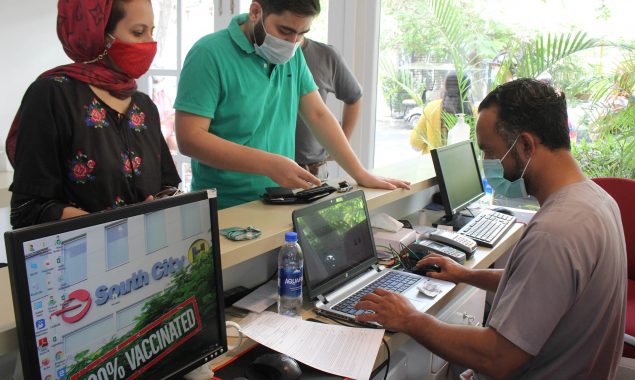
A health care worker registering people for COVID-19 vaccination in Karachi. Photo: Athar Khan/Bol News
KARACHI: As the government has introduced new measures to contain the Omicron variant of Covid-19, denial continues among the people of Karachi, the country’s most populous city.
Taking the new virus variant threat lightly, many people believe that it is the “same conspiracy” as previous variants that halt all economic activity of the country and make people starve.
Mohammad Shehzad who runs a small workshop near Golimar Chowrangi making motorcycle spare parts said that earlier the government had imposed strict lockdown that devastated the people and now a new lockdown will not be acceptable.
Read more: Re-intensify vaccination campaign only way to tackle Omicron, says Asad Umar
Mohammad Kashif who works at a local mobile phone company also asked that the government act accordingly otherwise people will take to the streets. “We cannot sit at home, we will react,” he asserted.
Farooq Ahmed, who lost his job during the pandemic said, “People are committing suicide due to unemployment and now there is talk of another lockdown. The fragile economy cannot bear another loss.”
Different market associations also believed that the government should not impose a lockdown, otherwise it will be the last straw to break the camel’s back.
Fresh restrictions in Sindh
The National Command and Operations Centre (NCOC) warned that the new variant of coronavirus, Omicron, was wreaking havoc worldwide, particularly in Europe, and eventually would also affect Pakistan.
Although the NCOC did not give any guidelines to contain Covid-19, Sindh government had issued notification to impose ‘soft lockdown’ throughout the province.
Read more: Pakistan calls for ‘fully equipped’ global accord to fight pandemics
The provincial government imposed fresh restrictions in the province to contain the Covid-19 Omicron variant of the coronavirus.
According to the notification, the government intensified restrictions for the ‘C’ category districts over slow pace of vaccinations and fear of a surge in infections.
The authorities concerned directed that attendance at hotels and restaurants in these districts may not surpass 50 per cent of total capacity.
Moreover, only 70pc attendance will be allowed for indoor dine-in gatherings while hotels will not be allowed to seat customers at more than 70pc of the total capacity.
The provincial government also imposed a ban on the participation of more than 300 people in weddings in Larkana, Mirpurkhas, Hyderabad, Khairpur and Ghotki districts.
Read more: Pakistan restricts travel from six African countries, Hong Kong over new Covid variant
It also banned indoor gatherings with participation of more than 500 people in Karachi, Sanghar and Sukkur divisions. These areas were included in the ‘B’ category due to a better ratio of vaccination.
The provincial government also announced that only fully vaccinated people will be allowed to enter cinemas throughout the province.
Only vaccinated individuals will be allowed to take part in activities related to tourism, board a flight, and enter a public park or a swimming pool area.
The new restrictions placed under the Viral Diseases Act shall remain in effect till December 15, the notification added.
Read more: Sindh requests federal govt to provide one million Pfizer doses for booster shots
However, all educational institutes of the province shall remain open until further directives.
It further stated that business activities in the province shall continue until 10pm.
What do medics say?
Health Services Director Karachi Dr Akram Sultan told Bol News that booster doses had been started in Sindh from Dec 1 in this regard. Flights to South Africa and other African countries had been banned in light of federal and NCOC directives to deal with the new coronavirus variant.
Health department teams were on alert at the airport while passenger screening, PCR and rapid tests were being performed.
Pakistan Medical Association (PMA) secretary general Dr Qaiser Sajjad said that a new wave of coronavirus was expected in December and January but unfortunately the federal and provincial governments had relaxed the restrictions regarding coronavirus, which could prove dangerous.
Read more: Only vaccinated people to be allowed to pray in Sindh mosques
He claimed that people were not taking precautionary measures against the virus. He further said that there was a danger till at least 70pc of the global population was vaccinated. He suggested that screening at airports and borders should be tightened and people should be vaccinated.
“The tragedy is that we have not been able to eradicate malaria in the last 70 years. Moreover, dengue, chicken pox and other viruses are spreading in the country,” observed the PMA official. He demanded that modern virology labs be set up at federal and provincial level for timely detection of new viruses and precautionary measures should be taken.
He said that coronavirus can be avoided by social distancing, vaccination and wearing of masks.
What does WHO say?
According to the World Health Organisation (WHO), the B.1.1.529 variant was first reported to WHO from South Africa on November 24, 2021. The epidemiological situation in South Africa had been characterized by three distinct peaks in reported cases, the latest of which was predominantly the Delta variant. In recent weeks, infections had increased steeply, coinciding with the detection of B.1.1.529 variant. The first known confirmed B.1.1.529 infection was from a specimen collected on Nov 9, 2021.
This variant had a large number of mutations, some of which were concerning. Preliminary evidence suggests an increased risk of reinfection with this variant, as compared to other variants of concern (VOCs). The number of cases of this variant appear to be increasing in almost all provinces in South Africa. Current SARS-CoV-2 PCR diagnostics continue to detect this variant. This variant had been detected at faster rates than previous surges in infection, suggesting that this variant may have a growth advantage.
Read more: Leaders call for dispelling myths surrounding vaccines
Citizens have been urged to take measures to reduce their risk of Covid-19 including proven public health and social measures such as wearing well-fitting face masks, hand hygiene, physical distancing, improving ventilation of indoor spaces, avoiding crowded spaces and getting vaccinated.
Read More News On
Catch all the Pakistan News, Breaking News Event and Latest News Updates on The BOL News
Download The BOL News App to get the Daily News Update & Follow us on Google News.




